
Are you suffering from back pain? Chances are, you’re not alone. Most people will experience back pain in their lifetime. In fact, about 10% of American experience back pain at any given time. That’s 31 million people! Total, 80% of Americans experience back pain in their lifetime, adding up to 248 million people! What is little known, is that there are many ways to avoid it. At Haggard Chiropractic located at Phoenix and Peoria, we want to help prevent you from being one of the 47 million people who suffer from back pain every year.
At Haggard Chiropractic, we have come to realize that people with back pain are three times more likely to become inactive in their daily life. In turn, they also are three times more likely to be in poor health. Mentally speaking, people with back pain are five times more likely to be in psychological distress. Back pain can deter people from living a normal and healthy life. It can also cause debilitating stress on the body and the spirit, making it hard (mentally and physically) to get off the couch and be active. That’s where Dr. Haggard, DC and chiropractic adjustments come in!
There are many causes of back pain, some are avoidable and some are unavoidable. Some forms of unavoidable back pain are trauma, aging, bone disease and viral infections. What we want to focus on is avoidable back pain. You can avoid back pain by being attentive to your posture, which can cause a misaligned spine. Straining muscles, having a weak core, smoking, and obesity caused by inactivity can be avoided so you can live a healthier life.

Posture
Retaining good posture can do more than just prevent back pain and neck pain! It can improve muscle tone, it prevents the “old age hump back", and it can also make breathing easier, and increase your self-confidence!
Dr. Haggard, DC’s tips for standing posture:
- Make sure the back of your head, shoulders, and buttocks are aligned.
- Hold your head up straight, making sure your ears align with the middle of your shoulders.
- Tuck your chin in a little to keep your head level.
- Keep your shoulders upright and your shoulder blades back.
- Bring your chest forward and tuck your stomach in.
- Allow your arms to hang naturally down the sides of your body.
- Shift weight from one foot to another to avoid standing in the same position.
- Keep feet about shoulder width apart and wear arched shoe support.
- Stand with your weight mostly on the balls of your feet instead of your heels.
Dr. Haggard, DC’s tips for standing posture:
- Make sure the back of your head, shoulders, and buttocks are aligned.
- Hold your head up straight, making sure your ears align with the middle of your shoulders.
- Tuck your chin in a little to keep your head level.
- Keep your shoulders upright and your shoulder blades back.
- Bring your chest forward and tuck your stomach in.
- Allow your arms to hang naturally down the sides of your body.
- Shift weight from one foot to another to avoid standing in the same position.
- Keep feet about shoulder width apart and wear arched shoe support.
- Stand with your weight mostly on the balls of your feet instead of your heels.
Dr. Haggard, DC’s advice for excellent sitting posture:
- The top of your computer screen should be slightly below eye level.
- Your computer screen should be roughly at arm’s length.
- Bring your shoulders up, then gently back down.
- Slightly curve your upper back and ensure proper lumbar support.
- Tuck your chin slightly in and make sure your rib cage is properly aligned with your stomach.
- Arms should rest parallel to the floor. Relax the front of your pelvis downward.
- Keep your knees bent at 90 degrees and keep your feet flat.
- Get up every 30-60 minutes to walk and stretch. It will help you reset your spine.
Dr. Haggard, DC’s advice for excellent sleeping posture:
- Sleeping on your back: try to make sure your ears, shoulders, and hips are aligned. Use a pillow under your knees to keep the natural curve of the spine.
- Hold your head up straight, making sure your ears align with the middle of your shoulders.
- Sleeping on your side: use a pillow between your knees to keep the upper leg from pulling your spine. Use a pillow at your waist to support your spine.
- Sleeping on your belly: This form is not recommended. However, if you are a belly sleeper, use a pillow under your pelvis for support. Do not use one under your head.
Exercise can be the greatest preventative measure for back pain! It will improve your posture and flexibility. It can also allow you to strengthen your back and lose weight. The best exercise routines to decrease back pain are routines that can strengthen your core and increase flexibility. Yoga and Pilates are both excellent choices. If you are suffering from back pain, avoid exercises such as weight lifting, contact sports, jogging, golfing, racquet sports, and sit ups.
Although some forms of back pain are avoidable, unfortunately genetics can make chronic back problems unavoidable. If you are injured or are suffering from chronic back pain for other reasons and live in the Phoenix and Peoria area, it’s time to call Haggard Chiropractic today for a consultation with Dr. Haggard, DC. Chiropractic Care is the best holistic approach to the pain relief you may so desperately need.
Source: http://www.chiropracticcare.today/back-pain-101/
Get $49 New Patient Special!
*Terms & Conditions Apply






